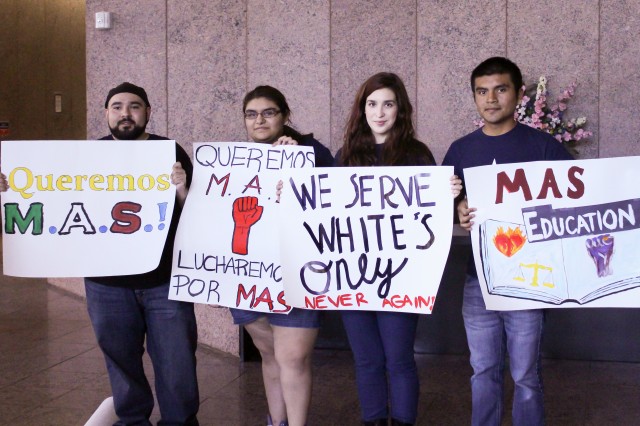State Board Vote Leaves School Districts on Their Own to Create Ethnic Studies Courses

Members of the Texas Freedom Network voice support for the proposal that the Texas State Board of Education should expand Mexican American studies courses in high schools statewide. Photo by Shelby Isbell.
By Shelby Isbell
For Reporting Texas
In April, the State Board of Education agreed on measures that could pave the way for new ethnic studies courses in schools around Texas. The sticking point is whether cash-strapped local districts will be able to find the money to pay for the elective classes, at a time when they’re pressed to cover student testing and other state mandates.
SBOE members voted 11 to 3 to ask publishers to submit textbooks for new courses in Mexican American, African American, Native American and Asian American studies for the 2016-2017 school year. But the board did not add such courses to the formal state curriculum, which leaves interested districts to their own resources to develop the curricula and train teachers.
The vote fell short of what proponents of expanded Mexican American studies had wanted – adding a course as a formal elective – and doesn’t guarantee that publishers will actually develop course materials. It reflects a longstanding rift in Texas educational politics between those who favor enhanced ethnic studies offerings and those who oppose funding such measures.
For school districts, the issue is more about limited resources than education politics.
Without state support, the burden will fall on “a district or an individual teacher to marshal the time and resources to create a course,” which is “time that most districts don’t have right now,” said Steve Simpson, social studies instructional specialist for the Arlington Independent School District in North Texas.
Emily Grobe, public information officer for the Hutto Independent School District northeast of Austin, said the state provides “less funding per student now than they did back in 2010, 2011. We have to make those hard decisions on what we are going to provide, what things are going to best support our kids . . . and if this is a course that is going to do that.”
More than 40 percent of the district’s 6,000 students are Hispanic, according to its website.
The SBOE ruling came about after proponents lobbied and collected petition signatures to include Mexican American studies in the official curriculum. Board member Ruben Cortez, a Democrat from Brownsville, put the issue on the agenda.
The board of the Houston school district, among others, voted to support such a move. More than 62 percent of the 212,000 students in the state’s largest school district are Hispanic.
The decision to include other ethnic study categories came at the behest of board members who argued that the provision needed to be more inclusive.
Board chair Barbara Cargill, a Republican from The Woodlands, said ethnic study courses should be up to local districts. “There are several school districts offering the course currently, and perhaps more will start to do the same,” she said in an email.
Some board members disagree with high schools providing ethnic studies courses. Before the vote, David Bradley, a Beaumont Republican who voted no, said he would be more supportive if there was an “Anglo American history course” and has called the proposal for a Mexican American studies course “reverse racism,” according to the Associated Press.
Proponents have long argued that, in a state where 51 percent of the student population is Hispanic, there should be a stronger focus on teaching students about the community’s contributions to Texas and U.S. history. Texas was part of Mexico until it won a fight for independence in 1836, and most of its 10 million Hispanic residents trace their roots to Mexico.
Georgina Perez, a former El Paso high school teacher, says students are more interested in school when their cultures are represented in the curriculum. “As a teacher for over 15 years,” she said, “I have seen students go from the brink of dropping out and quitting to not only staying in school, [but] finishing… with a diploma and receiving a scholarship, all because they see themselves in the curriculum.”
Districts have had the option to develop their own ethnic studies courses and don’t need state-approved textbooks under a 2011 state law, Senate Bill 6, but many don’t know that. The SBOE vote could draw attention to that option, according to proponents of expanded ethnic studies courses.
“Do you know how many school districts didn’t know they could do this?” Perez said. “Do you know how many school districts are so concerned with dropouts, and test scores, and budgets that they don’t even know that Senate Bill 6 exists?”
Proponents also say SBOE’s decision may get others involved in course development in the future. According to the website of the Texas Latino Education Coalition, the vote could lead to “a paradigm shift that breaks the habit of the state and its institutions’ development of legislation, standards, statutes and rules without the input of Mexican American stakeholders.”
Tony Diaz, a Houston activist who campaigned for Mexican American studies, said the vote helped turn a spotlight on an important issue.
“To me, the important part is that because of this big movement there is a huge outpouring of support that everybody noticed,” he said. “And that put [Mexican American studies] in the national conversation.”